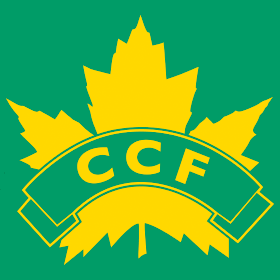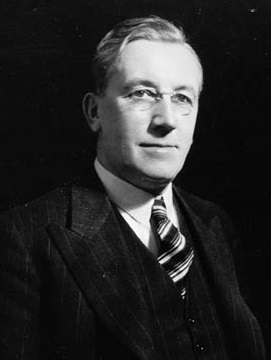External links
- The Chronicle (Barton, Vermont): Max Braithwaite obituary
- Geocities: Nokomis (Saskatchewan) obituaries: Max Braithwaite at the Wayback Machine (archived 27 October 2009)
John Victor Maxwell Braithwaite (7 December 1911 – 19 March 1995) was a Canadian novelist and non-fiction author. He was born in Nokomis, Saskatchewan and spent his youth in a number of communities in that province. As an adult he moved to Ontario, living in communities such as Orangeville, Port Carling and finally Brighton where he died at age 83.
Braithwaite won the Stephen Leacock Memorial Medal for Humour in 1972 for his book The Night We Stole the Mountie's Car.
The 1977 Canadian film Why Shoot the Teacher? was based on Braithwaite's 1965 novel of that name.

The Co-operative Commonwealth Federation was a federal democratic socialist and social-democratic political party in Canada. The CCF was founded in 1932 in Calgary, Alberta, by a number of socialist, agrarian, co-operative, and labour groups, and the League for Social Reconstruction. In 1944, the CCF formed one of the first social-democratic governments in North America when it was elected to form the provincial government in Saskatchewan.

Irving Peter Layton, OC was a Romanian-born Canadian poet. He was known for his "tell it like it is" style which won him a wide following but also made him enemies. As T. Jacobs notes in his biography (2001), Layton fought Puritanism throughout his life:
Layton's work had provided the bolt of lightning that was needed to split open the thin skin of conservatism and complacency in the poetry scene of the preceding century, allowing modern poetry to expose previously unseen richness and depth.

Major James William Coldwell was a Canadian democratic socialist politician, and leader of the Co-operative Commonwealth Federation (CCF) party from 1942 to 1960.

McClelland & Stewart Limited is a Canadian publishing company. It is owned by Penguin Random House of Canada, a branch of Penguin Random House, the international book publishing division of German media giant Bertelsmann.

Alfred Wellington Purdy was a 20th-century Canadian free verse poet. Purdy's writing career spanned fifty-six years. His works include thirty-nine books of poetry; a novel; two volumes of memoirs and four books of correspondence, in addition to his posthumous works. He has been called English Canada's "unofficial poet laureate" and "a national poet in a way that you only find occasionally in the life of a culture."
Robert Lorne Hunter was a Canadian environmentalist, journalist, author and politician. He was a member of the Don't Make a Wave Committee in 1969, and a co-founder of Greenpeace in 1971 and its first president. He led the first on-sea anti-whaling campaigns in the world, against Russian and Australian whalers, which helped lead to the ban on commercial whaling. He campaigned against nuclear testing, the Canadian seal hunt and later, climate change with his book Thermageddon: Countdown to 2030. He was named by Time as one of the "Eco-Heroes" of the 20th century.
Marjorie May "Maggie" Siggins is a Canadian journalist and writer. She was a recipient of the 1992 Governor General's Award for Literary Merit for her non-fiction work Revenge of the Land: A Century of Greed, Tragedy and Murder on a Saskatchewan Farm. She was also the recipient of the 1986 Arthur Ellis Award for "Best true crime book" for her work A Canadian Tragedy, about the involvement of former Saskatchewan politician Colin Thatcher in the murder of his wife JoAnn Wilson. The book was later adapted into the television miniseries Love and Hate: The Story of Colin and JoAnn Thatcher.
Colin Malcolm McDougall (1917–1984) was a Canadian author best known for his 1958 Governor General's Award-winning novel Execution.

One Dead Indian: The Premier, the Police, and the Ipperwash Crisis is a book by Canadian investigative journalist Peter Edwards about the 1995 Ipperwash Crisis and the shooting death of aboriginal land claims protester Dudley George by the Ontario Provincial Police on September 7, 1995. It was first published by Stoddart in 2001 and reprinted several times and published as an ebook.
Walter Douglas Stewart was an outspoken Canadian writer, editor and journalism educator, a veteran of newspapers and magazines and author of more than twenty books, several of them bestsellers. The Globe and Mail reported news of his death with the headline: "He was Canada's conscience."
James Barber was an English-born Canadian cookbook author and host of The Urban Peasant, a CBC cooking show.

This is a bibliography of major works on the History of Canada.
Anne Simpson is a Canadian poet, novelist, artist and essayist. She was a recipient of the Griffin Poetry Prize.
Kristen den Hartog is a Canadian fiction and memoir writer. She is the author of four novels; And Me Among Them, her most recent, was published in 2011.
Clarence Melvin Fines was a Canadian politician, teacher and union leader. He was provincial treasurer of the province of Saskatchewan during the Tommy Douglas era, and also served as Deputy Premier.
Nokomis is a town in the Canadian province of Saskatchewan.

The 1961 New Democratic Party founding convention was held in Ottawa from July 31 to August 4 to elect a leader of the New Democratic Party (NDP) of Canada. This convention formally closed down the Co-operative Commonwealth Federation (CCF) party, the New Party clubs, and merged them with the Canadian Labour Congress (CLC) to form the NDP. It is also known for the divisive leadership vote in which Saskatchewan Premier Tommy Douglas was elected over national CCF leader Hazen Argue. Over 2000 delegates attended the five-day convention held at the Ottawa Coliseum.
The following is a bibliography of Alberta history.
Albert Jacques Franck was a Canadian artist. He is known for his realistic paintings of Toronto winter scenes, dilapidated neighbourhoods and back lanes. His detailed paintings provide a historical record of conditions in some of Toronto's once less affluent neighbourhoods.
Paul Palango is a Canadian author and investigative journalist. Palango worked as a journalist and editor for The Hamilton Spectator and The Globe and Mail. He has written four non-fiction books about policing in Canada, including 22 Murders.